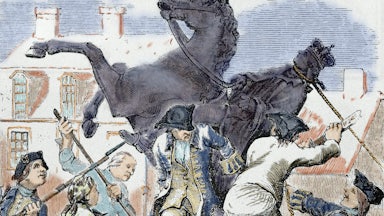Men would rather release a crudely recorded, willfully anti-commercial album about heartland serial killers than go to therapy. Fortunately for Bruce Springsteen’s legions of fans, in 1982 the Boss ended up doing both.
Springsteen: Deliver Me From Nowhere, Scott Cooper’s new rock star biopic, centers on the particularly troubled year that yielded Nebraska, now regarded as one of Springsteen’s best albums precisely for the reasons it alienated Columbia Records execs at the time. With no obvious singles, no E Street Band, no studio production, no supporting tour, no moments of relief from its consistently dreary and fatalistic tone—and without even featuring Springsteen’s marketable face (unlike his four previous albums) or ass (unlike his subsequent one) on the sleeve—Nebraska was nonetheless a top seller the year of its release. Today, it’s the album that hardcore fans push on hipster skeptics who regard Springsteen as unforgivably corny and earnest, as if to prove that there’s something much darker and artistically uncompromising beneath the lavish production featured on Springsteen’s era-defining, global smash follow-up, Born in the U.S.A.
Deliver Me From Nowhere may not be for those skeptics, though it offers plenty for the fans. For the past decade, Springsteen, who was 32 when he recorded Nebraska and is now an improbably energetic 76, has been assiduously managing his own legend even as he continues to tour. In 2016, he released a well-reviewed and bestselling autobiography, uncreatively titled Born to Run, sections of which he then adapted into a sold-out one-man Broadway show. Springsteen was reportedly involved with the film as well, if informally, and has appeared on Jimmy Kimmel to promote it alongside The Bear’s Jeremy Allen White, who plays him; the release of a box set of Nebraska outtakes is also timed to the film’s premiere. This is, in other words, an approved dramatization of its subject’s life, and how one feels about it may hinge on how one feels about Springsteen in his elder statesman era.
Despite all his objective success, and despite the gushing adoration of Barack Obama, David Remnick, and Chris Christie, Springsteen still has his share of detractors. In 2012, Leon Wieseltier memorably wrote, “The musical decline of Bruce Springsteen has been obvious for decades,” noting “the sanctimony, the grandiosity, the utterly formulaic monumentality; the witlessness; the tiresome recycling of those anthemic figures, each time more preposterously distended.”
As a takedown of late-period Springsteen, that’s hard to argue with, but Springsteen’s mystique has also suffered for decades by comparison to Bob Dylan, who basically established the male rock singer-songwriter template and whose mantle critics have tried to foist onto Springsteen since his 1973 debut record (the actual Dylan has released more than 25 studio albums since then). Dylan was also the subject of an artist-approved biopic last year, A Complete Unknown, whose critical and commercial success has set high industry expectations that Deliver Me From Nowhere has already failed to meet.
While both films follow many of the standard tropes of the musical biopic genre, they are quite distinct, much like their subjects. A Complete Unknown captures the most famous and best-documented period of Dylan’s long career, during which he recorded his most iconic albums, emerged from obscurity into superstardom, and controversially transitioned from acoustic folk to electric blues rock. Despite Timothée Chalamet’s faithful performance, the film made little effort to understand the elusive inner workings of Dylan’s mind, focusing instead on how he impacted the other, less opaque people in his life. That might be all one can reasonably ask of a Dylan biopic, given that Dylan has always presented himself as an enigma and has always insisted that whatever music he currently feels like making speaks for itself.
Springsteen is a completely different kind of artist, a confessional lyricist who usually gives the fans what they want, and whose recent legacy-tending has involved stripping away any subtext from his vast body of work; a better comparison might be to Taylor Swift (I mean this as a compliment). We don’t have to wonder what most of his songs mean or what he was thinking about when he wrote them, because lately he’s been happy to tell us. Deliver Me From Nowhere is made in that spirit, but whether that makes it more or less a form of fan service than A Complete Unknown is debatable. It doesn’t depict either of Springsteen’s two obvious career breakouts, Born to Run (1975) and Born in the U.S.A. (1984)—though it does manage to include performances of the title tracks of both—and instead homes in on a personal low point in between.
By 1982, Springsteen was an established and respected rock front man but not exactly a peer of Michael Jackson, whose Thriller came out that year and is still the bestselling album of all time. Coming off of the solid success of 1980’s The River and his first top-five hit, “Hungry Heart” (originally written for the Ramones), Springsteen was expected to produce a follow-up stacked with radio-friendly singles. Instead, he retreated into solitude in the woods of Colts Neck, New Jersey, where he recorded an acoustic set of somber folk songs on a cassette-based four-track recorder in his bedroom. Around half of the songs are from the perspective of murderers—the title track is taken from news accounts of Charles Starkweather’s late 1950s spree killings across Nebraska and Wyoming—while the other half are mournful reflections on a working-class childhood and a distant father. At least in retrospect, the murder songs reflect Springsteen’s emotional state at the time, while the daddy issues songs reflect the underlying cause.
Deliver Me From Nowhere includes frequent black and white flashbacks to Springsteen’s boyhood in Freehold, New Jersey, where he was raised by an adoring mother (Gaby Hoffman) and a drunk, abusive father (Stephen Graham). This fits with the background Springsteen describes in his memoir, though the extent of the physical abuse portrayed on-screen exceeds what has been previously disclosed. In the film’s main timeline in the early 1980s, Jeremy Allen White effectively channels mid-career Springsteen as a man haunted by that past and terrified of forming meaningful human connections. A decent fraction of the movie concerns his relationship with a fictional hometown waitress and single mom played by Odessa Young, apparently a composite of real girlfriends from this era, whose character exists mainly to demonstrate Springsteen’s brokenness. On the brink of solidifying his stardom, his inclination is instead to bare his wounded psyche to the world.
It’s a move that baffles not only Columbia exec Al Teller (the always nebbishy David Krumholtz) but also Springsteen’s longtime manager and guru, Jon Landau, played by Jeremy Strong as the film’s real hero, the only one who can save Springsteen from himself. Landau serves not only as the essential intermediary between the reclusive Springsteen and the record business, but as the empathetic father Springsteen never had. He shepherds Nebraska to release on the exact terms Springsteen specified, maintaining the Boss’s artistic integrity even as he questions the wisdom of it, and then he tells Springsteen to get the professional psychiatric help he urgently needs. Confronting a therapist for the first time in his new home in Los Angeles, Springsteen breaks down in tears, just as he says he did in the memoir.
We don’t see any of the actual therapy beyond that, but we’re told that it worked; that within a year, the E Street Band was touring again. In 1984, Springsteen released the polished Born in the U.S.A., featuring the backside of his jeans as snapped by Annie Leibovitz on the cover and including multiple obvious hits he refused to put on Nebraska, including the title track—which, although it’s actually a bleak story about a Vietnam vet abandoned by his country, was nonetheless adopted by Reagan-era conservatives as a patriotic hymn. That album sold over 30 million copies, and critics loved it and still do, but in hindsight it represents the peak of Springsteen’s career. He’s released a lot of good music since, but he’s never had anything left to prove, and after 1987’s Tunnel of Love he mostly stopped writing about his own pain, embraced the joys of parenthood, and accepted his ongoing role as a sort of national bard.
This makes for a curiously hopeful conclusion, in which it’s not exactly clear what Deliver Me From Nowhere is trying to say. The closing cards almost make it feel like a PSA for sad and angry young men to seek therapy, and there are certainly worse messages for America’s young men right now. But are we meant to understand Nebraska as a triumph of uncompromised artistry, or as a desperate cry for help from an artist drowning in generational trauma? Does the subsequent success of Born in the U.S.A. vindicate Columbia’s instincts two years earlier, or was a suicidally depressed Springsteen right to stick to his guns and release Nebraska first? Things ultimately worked out so well for Springsteen, for his label, and for his fans that it’s impossible to say; somehow we got both the tortured artistic experiment and the commercial breakthrough (which, if you parse its lyrics, is also the product of a tortured artist; “Dancing in the Dark” may have been written for the pop charts but it’s still straightforwardly about depression), and Springsteen is alive, happy, thriving, and eager to tell us all about it.
Therapy, for all its benefits, is rarely so stunningly effective. Most of us aren’t capable of writing Nebraska when we’re at our lowest or Born in the U.S.A. when we’re at the top of our game. Most of us, no matter how much professional help we get or how well we think we understand our own demons, still struggle at the end of every hard-earned day to find some reason to believe.






